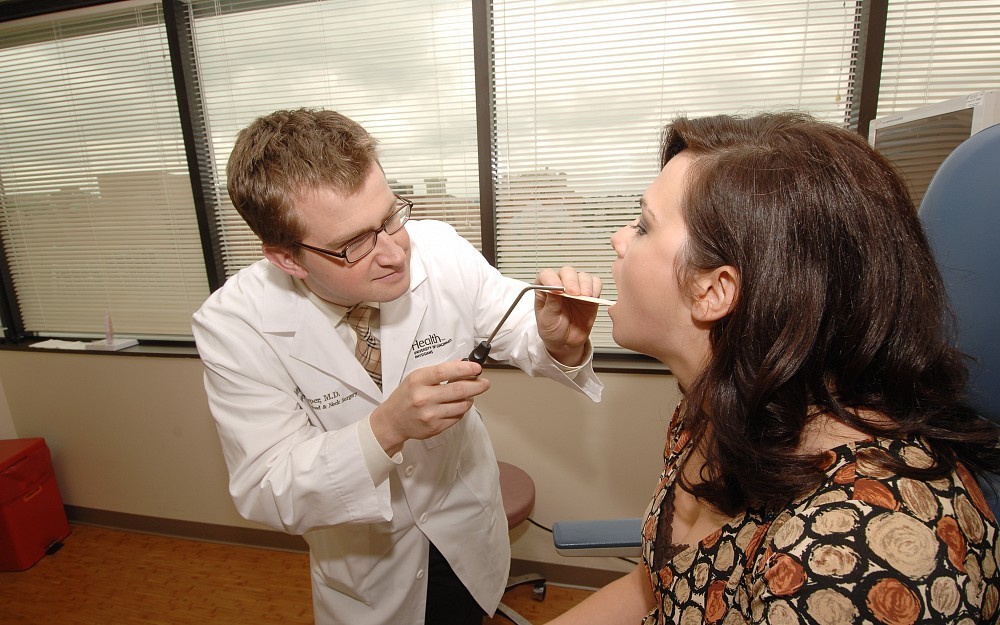
HEALTH LINE: Proactive Approach Helps Manage Swallowing and Speech Complications of Head and Neck Cancer
CINCINNATIPeople diagnosed with head and neck cancer face unique challengestrouble swallowing, impaired speech and sometimes physical disfigurementthat can greatly impact their quality of life.
Keith Casper, MD, a head and neck cancer surgeon with the University of Cincinnati (UC) Cancer Institute, says a proactive approach to managing and addressing these issues prior to the start of treatment is vital for keeping patients strong through treatment as well as for restoring normal function once care is complete.
"We are dealing with very intricate anatomic structures in close proximity to one another in head and neck cancer. Effective treatment requires a careful balance between the best treatment to eradicate the cancer and functional considerations, says Casper, a UC Health otolaryngologist and assistant professor at the UC College of Medicine.
He says that balance starts with ensuring patients maintain a healthy weight so they are strong enough to tolerate treatment. This can be a major obstacle for many patients, Casper says, because all forms of treatment can cause some degree of difficulty with swallowing, making eating an undesirable challenge.
Dietary and Speech Therapy Services
The UC Cancer Institute head and neck cancer team focuses on giving patients access to supportive services upfront.
At initial diagnosis, patients are connected with dietary and speech therapy services as well as oncology social work. These specialists work with the patient and physician team to develop a customized plan for the patient to follow throughout treatment and recovery.
"The short-term goal is to help patients maintain a healthy weight by matching foods they can tolerate with the calories they need to stay strong throughout treatment, says Kelly Guthrie, a UC Health registered dietitian with the head and neck cancer team. "Down the road, radiation can cause disturbances to taste, as well, so we can work to push caloric intake that is tolerable to patients when food doesnt taste good and they lose motivation to eat.
Speech therapists can help troubleshoot both swallowing and vocal challenges. This starts with a comprehensive, pre-treatment assessment of the patients voice and swallowing function to help guide the treatment typesurgery, radiation, chemotherapy or a combinationthat is chosen and craft a plan for addressing potential side effects of treatment.
"We are always concerned about preserving the patients ability to eat and speak after oral, head and neck cancer treatment, but our primary goal is to give them the best chance for a cancer-free future, adds Casper.
"If the patients voicebox is no longer functional, for example, there is no point in trying to preserve it by pursuing only non-surgical treatment, Casper adds "By doing a comprehensive swallowing and voice evaluation upfront, we can customize the patients treatment approach so that we pursue the treatment path that gives them the best chances of eradicating the cancer while minimizing side effects of treatment that impact quality of life.
Speech therapists continue to work with patients to manage side effects of cancer treatment throughout the process, including offering lymphedema therapy to help reduce the swelling in the face and neck post cancer treatment.
About Oral, Head and Neck Cancer
Oral, head and neck cancers affect the oral cavity (mouth, lips, tongue and tonsils) as well as the salivary glands, thyroid/parathyroid, throat (larynx and pharynx) and nose/nasal passages. Squamous cell skin cancer and melanoma can also spread to lymph nodes of the head and neck.
Tobacco use (both cigarettes and smokeless products) and alcohol consumption are the primary risk factors for head and neck cancerswhich affect about 3 percent of the U.S. population each year. Research also suggests that infection from certain strains of the human papillomavirus (HPV) causes more than 50 percent of oropharynx cancer, which develops in the middle part of the throat (pharynx) and includes part of the tongue, soft palate and sides/back walls of throat and tonsils.
Patient Support Group
The Cincinnati Head and Neck Cancer Support Group offers patients a forum to establish relationships with other oral, head and neck cancer patients in a safe, supportive environment. The nurse-moderated patient support group meets monthly, rotating locations between the UC Health Physicians Office in Clifton and UC Health West Chester Hospital. For more information, contact Angie Keith at 513-475-7366 or angie.keith@ucphysicians.com or visit their Facebook page.
Free Head and Neck Screenings
UC Health Otolaryngology (Head and Neck Surgery) is offering free head and neck cancer screenings on Thursday, June 20, 2013, from 8:30 a.m. to 4:30 p.m. Screenings are free and open to anyone, but appointments are required. To reserve a spot, call 513-475-8400.
To learn more about the UC Cancer Institute head and neck cancer teamincluding clinical trials open to patient enrollmentvisit uccancer.com/headneck.

Keith Casper, MD
Related Stories
Ohio could soon make breast cancer screenings more affordable
May 9, 2025
The University of Cincinnati Cancer Center's Ann Brown was featured in Local 12 and Cincinnati Enquirer reports on a bill introduced by Rep. Jean Schmidt in the Ohio legislature that seeks to eliminate out of pocket medical expenses such as copays and deductibles associated with supplemental breast cancer screenings.
Preparing students for artificial intelligence in education
May 8, 2025
Laurah Turner, PhD, associate dean for artificial intelligence and educational informatics at the University of Cincinnati's College of Medicine, recently joined the For The Love of EdTech podcast to discuss the usage of personalized learning and AI coaches to enhance educational experiences.
UC lab-on-a-chip devices take public health into home
May 8, 2025
University of Cincinnati engineers created a new device to help doctors diagnose depression and anxiety. The “lab-on-a-chip” device measures the stress hormone cortisol from a patient’s saliva. Knowing if a patient has elevated stress hormones can provide useful diagnostic information even if patients do not report feelings of anxiety, stress or depression in a standard mental health questionnaire.
